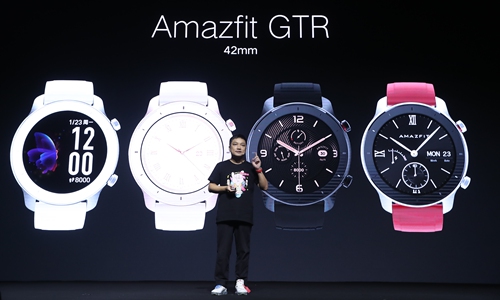HOME >> BUSINESS
Smart wearable innovation peaking
Source:Global Times Published: 2019/11/15 10:28:34

Huang Wang, co-founder and CEO of Huami, makes a speech at the event held in Beijing in July, 2019. Photo: Courtesy of Huami
On Tuesday, smart wearable innovation company Huami Corporation released a bright third-quarter earnings report.
In the third quarter of 2019, its revenue reached 1.86 billion yuan ($260.6 million), an increase of 73.3 percent year-on-year, far exceeding previous expectations. At the same time, gross profit increased significantly by 63.8 percent to 470 million yuan from 287 million yuan in the third quarter of 2018, the fiscal report said.
In the meantime, revenue and shipments in the first nine months have already exceeded performance for the whole of 2018.
"Our revenue performance was the result of strong sales for both the Mi-Band 4 and our newly released Amazfit products, as both brand categories have become increasingly recognized and desired by global customers," Huang Wang, founder and CEO of Huami, said in the earnings call on Tuesday.
Previously, the Xiaomi-backed company had estimated that operating income in the third quarter of 2019 would be between 1.66 billion yuan and 1.67 billion yuan, an increase of 52.6 percent to 55.4 percent.
The company also saw robust sales in the just passed Double 11 e-commerce festival. This year, Amazfit product sales reached the level of last year's Double 11 whole day sales in just one hour and Mi-Band 4 sales reached 350,000 units in only 10 hours.
With the fast-growing market as well as effective strategies, the company has great confidence in future product sales both at home and abroad, he said.
Founded in 2013, Huami's main business is now smart watches and wrist band, as well as sports and health-related products. The strong sales are connected with the global boom for wearable devices, but the market is full of changes.
Media reports recently said that Google will buy wearable company Fitbit for $2.1 billion.
The news came just days after a report from Reuters, which claimed Google owner Alphabet had made an offer to acquire Fitbit, as it eyes a slice of the crowded market for fitness trackers and smartwatches.
"It is a landmark event, and there will definitely be more players entering the wearable device market, bringing more money and technology, making the market bigger," Huang told the Global Times earlier this month. "Also, the market will be educated, and users will have more understanding of our products."
As early as in 2015, Apple launched its Apple watch, which was regarded as a turning point for the wearable device market, and there have been more players joining since then.
IDTechEx, a leading market and technology research firm, said in a report released in July that wearable technology products are thriving, with a total market worth over $50 billion in 2019, having more than doubled in size since 2014.
According to Frost & Sullivan, from 2018 to 2023, the global wearable device market average compound annual growth rate (CAGR) will be 20.9 percent, while the figures for the Chinese market will be 23.8 percent, and for the global smart watch market, the CAGR will be 26.8 percent.
However, except the Apple, Samsung and Huawei, more mobile phone players are entering the market.
Huang noted that mobile phone market competition is intense and the companies need to put a lot of effort into wearable device development, so it will be hard for them to challenge specialist companies.
While Google has joined other major technology firms such as Apple and Samsung in developing smartphones, it has yet to develop any wearable offerings, Reuters reported.
Huang said that the shipment from China now accounts for half of its market, but "we plan to explore more in overseas markets, making the Chinese shipment share about 30 percent in the next two or three years."
Huang also said he has confidence in the Chinese hardware market, as China is the center of manufacturing in terms of industry chains, and has advantages in terms of talent, R&D and production speed.
"The hardware companies in Silicon Valley will be conquered by the companies in China in the future," he said.
Posted in: COMPANIES